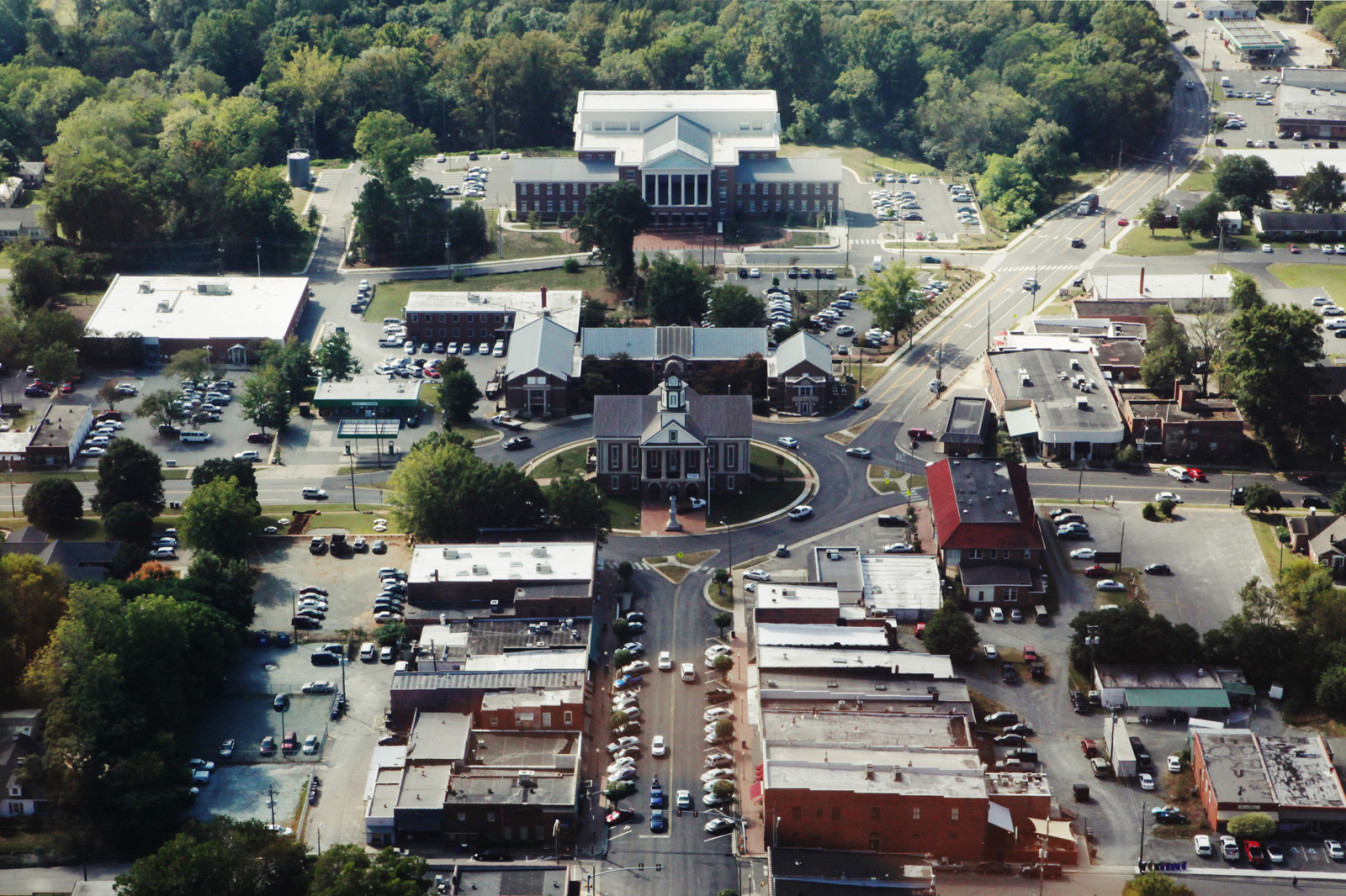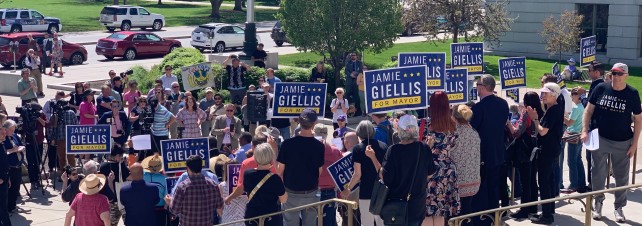This story about a massive development proposal first appeared in The News & Observer in 2014. The town of Pittsboro approved Chatham Park’s master plan on June 9, 2014. Above, Pittsboro as it stands today.
CHATHAM COUNTY — Bob Epting’s tour-guide narration cut in loudly over the headsets as his Piper Cub droned a few hundred feet over a four-lane highway. Down below, the county’s first Walmart and the curls of a few subdivisions looked like islands in the trees and haze.
“We used to call this the ‘Big Woods,’ ” the longtime Chapel Hill lawyer said. “ … Thomas Wolfe said, ‘The forest creeps up on Chapel Hill like a great beast,’ and you can see what he was talking about.”
That creeping forest remains one of the last rural corners of the Triangle, and Epting was aloft to see the scale of what developers have planned for eastern Chatham County. From the ground, it’s hard to comprehend the sheer enormity of the proposed development known as Chatham Park: 60,000 people, 22,000 homes and clusters of corporate campuses all spread across 7,500 acres. A new corner for the Triangle, in other words.
Epting’s antique plane banked left over the rocky Haw River. As it leveled, the blank woods of “the assemblage” spread out from the cockpit windows, framed only by the river, the road and the long shore of Jordan Lake.
Chatham Park is the brainchild of Tim Smith, one of the most successful developers in the Triangle. With the sole financial backing of SAS co-founder Jim Goodnight – one of the 100 richest people in the world – Smith’s company, Preston Development Co., has spent more than $100 million in recent years buying a spread half the size of Chapel Hill.
If built, Chatham Park would be the largest private development in North Carolina’s recent history. It would transform the town of Pittsboro, which the developers hope will be their host and partner.
For the 1,500 or so families who live in Pittsboro, the Chatham Park proposal is a referendum on the town’s future.
Tim Smith and his company have asked the town government to bring the Chatham Park land inside the town’s boundaries and declare the area appropriate for a “planned development district.” This action would essentially put the project in motion, setting it up for water and sewer access and loosening town rules for its development.
But the town remains very much divided over the project, and arguments in favor and against Chatham Park can be heard at Virlie’s Grill, the farmers market and the podium of the old courthouse. There’s even disagreement about how many people are on each side of the debate.
Some worry that the town is delaying a one-time chance. Others say Chatham Park could overwhelm Pittsboro’s culture and its environment. Epting, with a background in environmental law and local politics, is among the critics.
The decision could come within months, when five elected members of Pittsboro’s board of commissioners are expected to vote on Chatham Park’s 58-page proposal. Within three years, construction could be in full swing. By 2050, if the project proceeds, Chatham Park could make Pittsboro a new city.
A rural frontier
Tim Smith doesn’t tell a very romantic story about Chatham Park. The initial inspiration for the project was “frustration,” he said last week at his Cary office.
Ten years ago, Smith and his partner Bubba Rawl were riding high on land deals that became some of the Triangle’s most lucrative residential communities. They were central players in Preston and The Arboretum in Cary, and Wakefield Plantation in North Raleigh.
The pre-recession market, however, was bringing on enough growth to change the scenario. Land prices in the the Triangle were surging, large lots grew scarce and wait times for government approvals had multiplied to years, according to Smith.
“We like to keep 30 projects going at all times,” Smith said, leaning forward in a white leather chair. “We keep a funnel of projects so I can keep our people busy. You’ve got to feed the funnel.”
The answer, he figured, was one very big project.
“We want a world-class project. We don’t want another Wakefield Plantation,” Smith said. “It’s a great place; it’s got a golf course. But nobody comes from around the world and looks at that.”
Smith pulled a huge laminated map onto his conference table, then pointed at each of the spots he had considered. Cary was practically full. North Raleigh, too. All the growth towns east and south were opportunities that had passed. Chapel Hill was never going to grow like he wanted.
Then there was Pittsboro: Two major highways offering a reasonable commute to Cary and Chapel Hill, thousands of acres waiting in undeveloped lots and a permanently protected lake for a border.
The developers bought the heart of Chatham Park – 1,800 wooded acres – from a retired judge in 2006. They added 5,000 acres more before the recession started, and they resumed buying soon after, in 2010. While banks pulled funding from countless smaller projects, Smith had an ace: He’d known Jim Goodnight since the billionaire was a professor with an office on Hillsborough Street.
Goodnight has funded Smith’s ventures for 20 years. Together, their businesses symbolize the Triangle’s recent history: Preston Development built prim suburban neighborhoods, and SAS brought thousands of well-paid tech workers to fill Smith’s houses.
Chatham Park as it’s planned today likely wouldn’t be possible without Goodnight’s backing. Banks generally are not lending money for city-scale plans.
And with that rare asset, Smith thinks he can reinvent the way people live in the Triangle. His team imagines scores of campuses for “clean-tech” and high-tech companies, motion-sensor streetlights, electric-car plugs in every garage and driverless drone buses looping around Chatham Park. It’s going to be “live-work-play,” the developer says often enough to realize he’s repeating himself.
“I’m 65 years old,” Smith said. “We want to go out big.”
Splitting Pittsboro
Mark Hewitt and Carol Peppe Hewitt were among the first to hear about Chatham Park.
He’s a master potter, and she runs Slow Money NC, which brings funding to small local businesses. As neighbors of the project – and with Goodnight and Rawl as major buyers of Hewitt’s pottery – they hosted the developer’s tour groups a handful of times in Chatham Park’s early years.
“It was Tim, looking over the map and saying, ‘We want to buy it all,’ ” Mark Hewitt recalled of one early meeting.
“We just didn’t believe him,” Carol Hewitt said. “We should have.”
Today, three edges of Chatham Park are less than a quarter-mile from their home and pottery barn, and their trepidation has turned to outright protest. First, Mark Hewitt unloaded his criticisms on the developer and a guest.
“I think they referred to me as ‘local color.’ I’m a local celebrity. Isn’t this a wonderful place? Don’t you want to invest here? But this isn’t what they’re investing in,” said Hewitt, British by birth and a long-time Pittsboro landowner. “It rips the heart out of the downtown.”
The couple spoke up at the old courthouse last year, packing in with close to 200 people for the town’s most contentious meeting in years. Outgoing mayor Randy Voller had called for a rezoning vote in his final official action, but Chatham Park instead faced its most hostile crowd to date, which was largely organized by the critical group Pittsboro Matters. The decision was put off.
The opposition runs the gamut. Some people worry that Pittsboro’s artisan culture and independence will erode. For at least a few, the size of the project is too much to bear.
“Pittsboro’s one of those towns that I’d say, in my mind, has appropriate scale,” said Gary Phillips, a real-estate agent with a curled-up mustache.
He remembers how everyone in town lined up for the opening of the Hardee’s on East Street in the 1970s, and it seems that the suburbs haven’t spread much since then. There’s a Food Lion and a Piggly Wiggly, and a stretch of newer-style homes in a loop on the edge of town. But, for the most part, Pittsboro looks like it could be from a different era.
Others mount environmental criticisms of Chatham Park. The Haw River Assembly, a group dedicated to protecting the river, has said the development would have to keep more than half its land as woods in order to protect water quality in Jordan Lake, the regional reservoir and a drinking water source for close to 300,000 people. In an earlier report, the Triangle Land Conservancy suggested that development in the area should include stream buffers twice as wide as Smith’s team plans in order to keep runoff out of the lake.
The Haw River Assembly also questions where the development would put its treated wastewater and where it would get its drinking water supply. Others ask whether Smith’s community will be too expensive for the poor, or whether it will have access to transit.
“We don’t know anything. We ask each other, ‘Where’s the bypass going to be?’ ” said Teri Deal, 52, standing on a wide front porch. “… It’s in our backyard, and I’ve never even met the people.”
Carbon neutral plans
Smith argues that his company has the motivation to handle things correctly. In Preston Development’s presentations, Smith and his team have a goal to build a “carbon-neutral” development and one of the largest solar power generation facilities in the state.
Asked about water-quality concerns, Smith and a planning consultant, Philip Culpepper, said the project would meet, and may in some cases exceed, state standards.
The pair acknowledged that Chatham Park’s housing may be more expensive on average and that transit would be a long way off, but they argued that a range of types of houses and the “live-work-play” philosophy would help lower-income families.
Advocates of “master planned communities” say that the city-sized developments, such as Reston, Va., and Irvine, Calif., have proved more resilient than smaller communities. The American “new towns” built in the 1960s and 1970s introduced “smart-growth” concepts, including ideas about “walkable” areas and communal mixes of houses, parks and businesses.
The Woodlands outside Houston, which Smith says is a model for Chatham Park, was one of the first modern developments to preserve large swaths of woods in order to protect its watershed.
Still, many specific criticisms of Chatham Park have no answer yet. While the proposed master plan paints Chatham Park in broad strokes, it gives the developer leeway to reformulate plans, excuses Chatham Park from building height and setback rules, and leaves much to be decided later.
If Chatham Park were approved today, Smith would have two more years to submit master plans for issues ranging from public art to stormwater controls and public services. The smaller details – such as architectural guidelines for neighborhoods – could change later.
In the meantime, the project is bleeding money. The land is valued at $100 million, bringing a tax bill of roughly $750,000 per year, according to public records. Preston already employs several groundskeepers and a consultant to manage the huge spread, which contains only three occupied homes.
“Just give us the nod, and we’re ready to take off,” Smith said.
The town of Pittsboro, however, has brought a freshly critical eye to the development in recent months.
New questions
Bill Terry, the newly elected Pittsboro mayor, says he’s done the math: In a fully built Chatham Park, the current residents of Pittsboro would go from 100 percent of the town’s population to 8 percent.
That scale underscores his responsibilities. He largely accepts Smith’s central argument – that Preston Development’s money and resources could be better for Pittsboro than traditional piece-by-piece development – but he comes into the mayor’s job with strong reservations.
“I fully get that there’s a potential here to develop a planned community that would be a model, that would be looked at as something that probably hasn’t been achieved very often anywhere in the country,” said Terry, the former town manager for Pittsboro. “And I get that they have deep enough pockets to make something like that happen. But there are days that I don’t feel like we’re being dealt with as equal partners in the process.”
The mayor wants to see a more detailed accounting of the project’s cost, particularly its infrastructure. He wants to know whether the town will be able to pay to triple its water capacity and whether the town will give up any leverage with Chatham Park if it votes to approve the project. He’s worried, he said, because Pittsboro has a planning staff of one.
If Pittsboro doesn’t cooperate, Smith said he could circumvent the town and build a research center or smaller county-based subdivisions. He also could petition the legislature to make Chatham Park its own city. Smith stressed that he did not intend to make a threat of those possibilities.
“Or you can just chop it up,” Culpepper said, “and turn it right back into the junk we were trying to avoid.”



